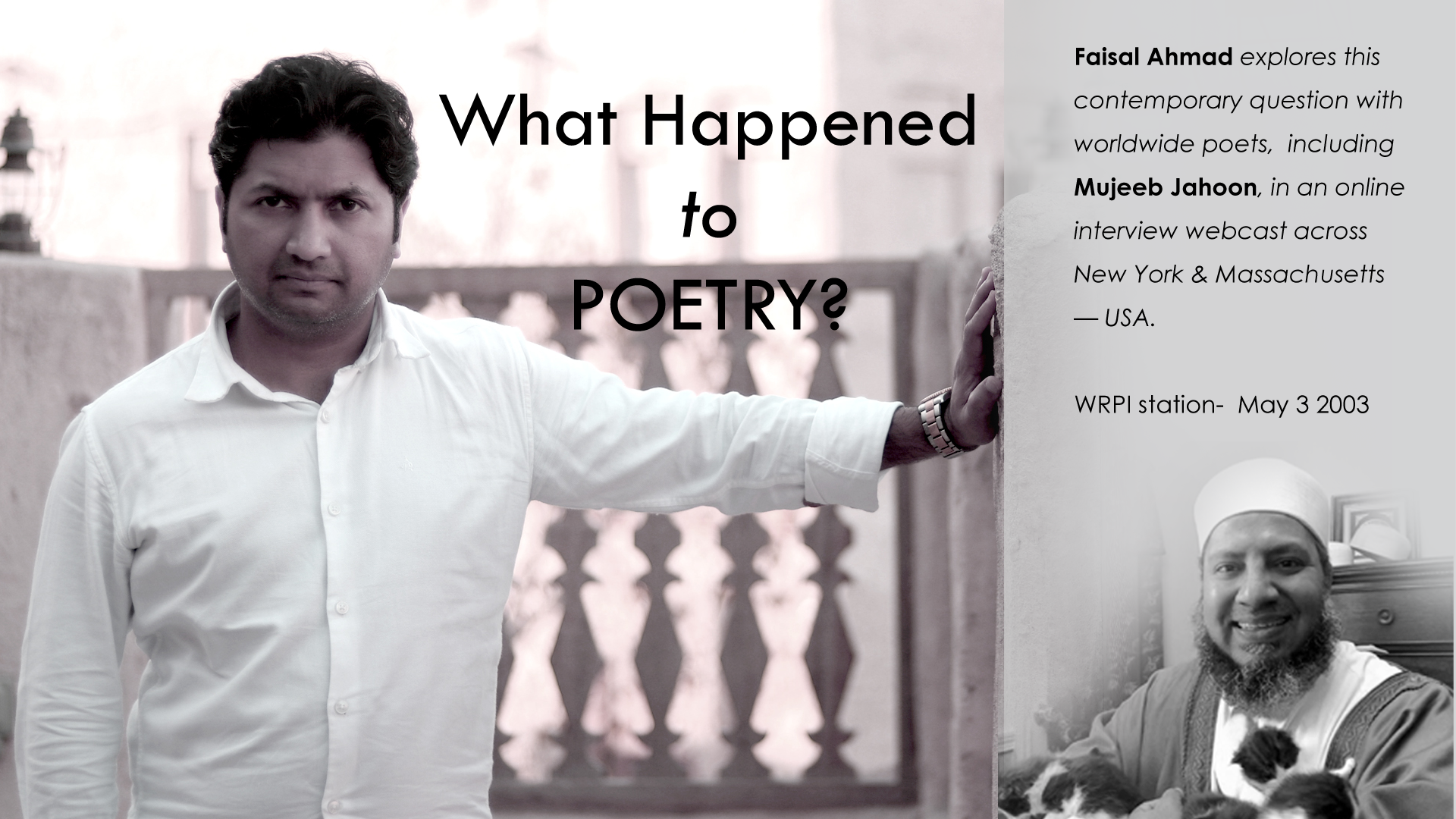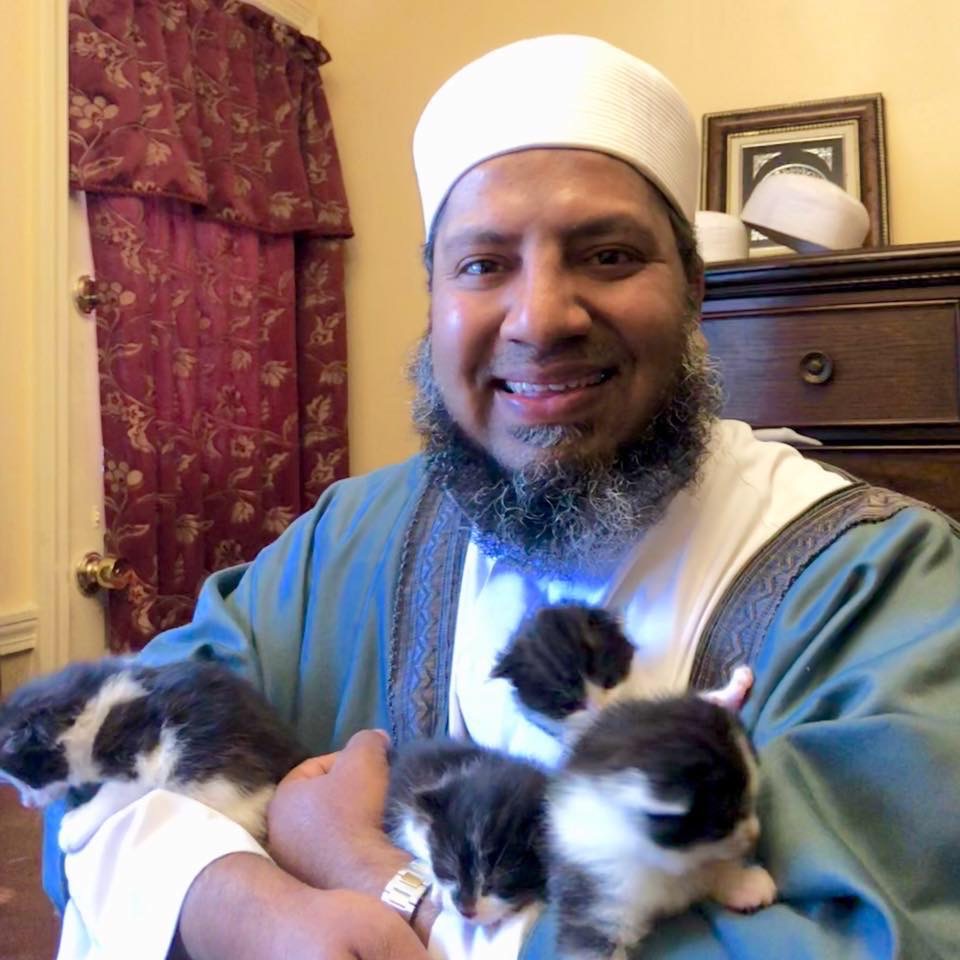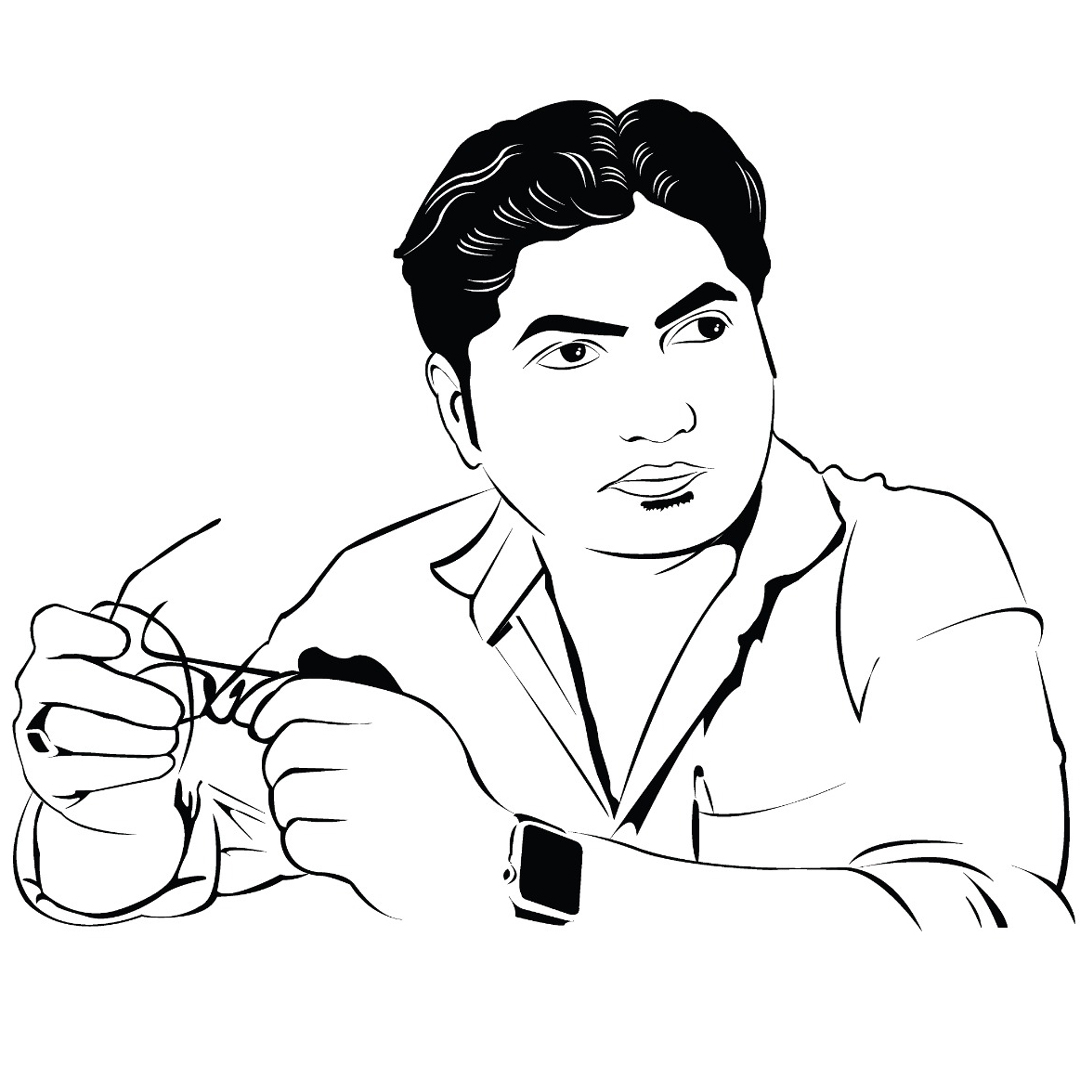Faisal Ahmed, Islamic activist based in upstate New York, explores this contemporary question with insights from a host of poets from around the world, including Jaihoon. The show, conducted by WindowonIslam, was broadcast on WRPI station in NY, USA on 2003 May 3rd 12.30am (UAE time). WRPI broadcasts 365 days a year, serving listeners in Albany, eastern New York, western Massachusetts, Vermont, and via webstream
The host concluded by identifying and relating the role of compassion in the life of Holy Prophet sallallahu alaihi wa sallam and its relevance to the present heartless era, something which the world has terribly missed, even among a section of the Muslims!
Having traveled extensively, Faisal has had the honor to study with Imam Hamza Yousuf Hanson. He is currently the director and co-founder of The Fiqh Institute.
Listen
Faisal: We have an interesting program lined up today, ‘What happened to poetry’. We are going to have a guest from the United Arab Emirates, who had recently published a book entitled Egoptics. Brother Jaihoon is going to join us and we are also going to accept phone calls. Today the idea is to share experiences, our insights and the way we see the world; through words.
Now, today the topic is what happened to poetry, and for most of the Muslims when they hear the word poetry it strikes a chord in the heart because of the great history of poetry within Islam. We have had a large number of poets. Today we have Jalaludhin Rumi.. there’s been quite a bit of books and translations of his works by some, notable Coleman Barks. For the Muslim, Jalaludhin Rumi has always been an inspiring poet, but firstly a researcher and a knower of God. So Muslims always admire poetry, as it has been a means or vehicle for the transcendence of that Veil. So the words of poets actually make a veil that transcends the ineffable of the Divine and that’s what we are hoping to share in today’s program.
There’s a Hadith of Prophet Muhammad (peace be upon him) and all other prophets as well; that within poetry there is magic. Meaning, that within words there is magic. That, word has a special ability to strike a chord within the heat and bring some kind of a meaning to the poor person’s heart. So that’s what we are really trying to search today, and to allow our hearts to open and hear something.
Now I would like to start by inviting a special guest and also a dear friend of mine, bother Jaihoon is joining us from the United Arab Emirates, hailing from Sharjah, as he likes to say. And I would like to welcome him to our program.
FAISAL: Assalamu Alaikum brother Jaihoon.
JAIHOON: Wa’laikumussalam.
FAISAL: Thank you very much for joining us on Window on Islam. We have been in touch through the Internet. But it’s great to have you in person.
JAIHOON: Thank you! Ja’zak Allah Khair.
FAISAL: I think you could start by saying the meaning of your name, Jaihoon. It seems to be your pen name that you use. Does it have any special signification? Is it something from Iqbal’s poetry or something. Does it have any special meaning in Arabic or Urdu?
JAIHOON: Yes, Jaihoon is the name of a river in Turkistan. It is the river to which the Mohammed Iqbal, the great mystic poet or also known as the great poet of the East, compared his poems. So I got inspiration from the same name, may be because of the similar taste. And that’s why the name Jaihoon.
FAISAL: O Masha Allah! Very interesting. I would also like to ask you, as you are a very good and talented poet, what is it in poetry that motivated you to get into poetry and to convey the messages to people with words?
JAIHOON: It is very much true that most of the people in today’s world do not have a taste in poetry. Maybe it is because of the materialistic and shortcut way of life that we do not have the time to get into the imaginative world of poetry. But at the same time, poetry hasn’t lost its splendor and sharpness to get its message right to the hearts of the people. A message in prose can contain maybe pages and pages, but a couplet can strike right at the heart. So I thought, why not I try a short cut method like that?
FAISAL: Very fascinating, brother Jaihoon. I would like to ask you how poetry has affected you in your life and your journey to discover more about the world.
JAIHOON: Well, poetry is something that comes right from the bottom of the heart. You cannot mend it like the way you want. It’s a domain, which I found myself where I can express myself in the most intense form.
FAISAL: Now could you tell us how you discovered Iqbal and who Iqbal is?
JAIHOON: In Iqbalian philosophy, you see a realization of your self. It may be alluding to the words of the Hadith, ‘man arafa nafsahu arafa rabbahu‘, meaning ‘if you know yourself you have known the God’. And you can also see the hidden potential within each human being. Iqbalian poetry gives you a cultural conviction also, to withstand any onslaught of a foreign culture.
FAISAL: Hmm that’s very fascinating. As Muslims living in the world today, we find poetry motivates you in the sense that you are defending or finding some solace in a very difficult world. Do you find solace in the words of poetry you write?
JAIHOON: Yes.
FAISAL: I was wondering also, if you could comment on Jalaludhin Rumi. He is very famous here in America. He has captivated a lot of minds of people in America. Could you tell us something about him and why he is so influential?
JAIHOON: It is very good news that Rumi is right now the best selling poet in America. It also speaks out the kindheartedness of the American public. And it is a fact that at the time of the Afghan war, Rumi was equally appreciated in America as in Afghanistan.
FAISAL: That’s very fascinating.
JAIHOON: …and Rumi’s message is of humanism. It has definitely trespassed the barriers of religion, race, caste and region. One more point I would still like to add is that people understand Rumi in different ways. Maybe he is not understood the same way in the West as in the East. For instance, Allama Iqbal has made Rumi as his spiritual mentor. About the misunderstanding of Rumi’s words, he said thus:
Nothing they learnt save the chant and whirl
And shut their eyes to the dance of the soul!
FAISAL: Wow! Based one that I know that, Rumi and Iqbal has had a great influence on your poetry. I was wondering if you could share with us some of your more recent works from Egoptics.
JAIHOON: I shall read a poem that is very relevant in the present world:
The present world is in need of a tender hand
That would reach out to everyone.
A hand that is clean from the wrinkles
Of hate and prejudice;
With the true embodiment of humanism,
One should be able to bring back the smile
That has been stolen from the innocent.
There should be an end
To the violence and extremism.
The world awaits a human hand
To knit all the broken hearts…
FAISAL: Wow! That was very meaningful. And what we are trying to find is that Helping Hand, and through words we can really share that feeling in the minds and hearts of people. Do those words of your poem come from the sense to help people and to reach beyond the politics and to reach back to something human? That’s what it sounds to me, more real and more spiritual. Very beautiful!
JAIHOON: Ja’zak Allah Khair.
FAISAL: Well you got anything more to say. What Egoptics means?
JAIHOON: Ego means the self, or the personality, and optics means the vision. So it’s the vision of the inner self.
FAISAL: Ok that’s nice. Now I just like to close out with the time. It was really amazing and I think a lot of people would love to read more about your poetry and make them check out at Jaihoon.com for more of this beautiful poetry you read. I think you could just sign out by saying what the future of poetry is?
JAIHOON: Well, poetry is not just the world of imagination and fantasies. Poetry has its own right of existence in this world of rush. And also one should understand that lots of goodness is hidden in poetry. For example, many people have a misconception that poetry is not encouraged in Islam. It’s a very wrong misconception, developed unfortunately because of some people’s actions. In Islam there is a very clear-cut approach towards a poet’s stand. The Quran tells in one place ‘…and as for the poets, the misguided follow them. Have you not seen how they wander about every valley and how they say what they do not practice?” And then in the same verse the Quran says, “Except for those who believe and do good deeds and remember Allah much”. So we can see that the Quran first gives the description of bad poets about which Imam Busiri says “qaulu bila amal”, “they say what they do not do”. This is hypocrisy!
FAISAL: Wow! A very different and meaningful word from a poet. I think it lends meaning and depth to words you write.
JAIHOON: Prophet Muhammad sallallahu alaihi wa ala alihi wa ashabihi wa sallam also established a pulpit in his Masjid An Nawabi for the poet Companion Hassan Bin Thabit. So we see there was a pulpit just for a poet in Madina.
FAISAL: I think your words help us people here and it’s a great wok you doing there in the Middle East. I think it’s actually important to understand that we Muslims are the people of the Book and people of words who admire language and Arabic is certainly the most majestic of those languages in the world.



